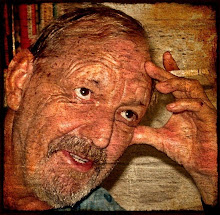On my last visit to Jerusalem, in the spring of 1995, I stayed in a small pension house in Salaheddin Street, the main thoroughfare of East Jerusalem, running directly away from the walls of the Old City. It's a part of the city I have liked ever since I first visited in 1973, in the aftermath of the October War.
I have tried, since my experiences of that first visit, and others, not to consciously enter 'Israel' itself, but that evening, I did. I walked up to 'Zion Square', off the Jaffa Road, and had a few coffees and drinks with some entirely sympathique Israeli bohos, hippies, beatniks, call them what you will, and thoroughly enjoyed the evening. I even went on to The Underground, a very enjoyable cave disco, where, as usual, I failed to score at all.
There was a disquieting note; whenever I said where I was staying, and whoever I spoke to, I was warned that that East Jerusalem was a very dangerous area, and I should not walk there on my own; take a taxi, if one would take me.
So I set off home, straight down Yafo Street, past Sbarro, a sudden, terrible reminder of the depths the Israeli/Palestinian asymmetrical conflict can reach, and on past the old West/East Jerusalem border point, to the street (don't know it's name now) that runs along the side of the North walls of the Old City, down to the Damascus Gate.
It was the last day of Ramadan, the equivalent for us of the end of Lent, and the beginning of the quite pagan festival of Easter. This was the evening of the beginnings of Eid al-Fitr.
In the small sunken square between the street and the Damascus Gate, a small fair had been set out, with sweetmeat and candy stalls, balloons, and fairground junk of all kinds for sale, in the style of village festival fairs worldwide. There was a suppressed air of gaiety.
The reason for the 'suppressed air of gaiety' wasn't difficult to find. On the opposite pavement of the main street was lined a row of fully-armed soldiers, kitted out with full combat pack, from grenades to Uzzis, and visibly tense, spoiling for a fight.
I've seen that kind of confrontation before, so I walked on, a little faster, and turned left into Salaheddin Street, ambling by now. The street was eerily quiet and empty.
I looked into the occasionally lit shop display, window-shopping as I went. I was considering buying something in a goldsmith's when I heard a commotion back down the street.
A small scattering of pre-teenage youths were running up the street, and passed me. Behind them was a fully-armed, aggressive squad from the 'Israeli Defense Force', running, and swinging clubs.
I nipped into the shop, and the shopkeeper beckoned me behind, and under, his counter. When several angry, hyped-up soldier bully boys entered, he kicked me, to make sure I stayed hidden, and quiet. He covered me well.
I couldn't make out the IDF men's guttural Hebrew demands, but he could, and countered them with consummate diplomacy.
Afterwards, when they had well and truly gone, I got up, dusted myself down, and complained bitterly that he had, perhaps, given me a bit too lively a kick to keep me quiet.
He just said, very quietly:
"They learned, in Poland and Russia, sixty years ago, what it was like to live in a ghetto. No they're giving us our turn".
And they have been doing it ever since:
See this, written in 1997, ten years ago, and perhaps identifying only the very beginnings of the ethnic cleansing in its early stages:
"The streets of East Jerusalem's commercial center begin to empty in mid-afternoon, as the workday ends and people return to their homes. By evening, when Ramallah, Nablus, and Gaza are teeming with people strolling the sidewalks, chatting on street corners, and dining in restaurants, Jerusalem's main thoroughfare, Salaheddin Street, is as quiet as a graveyard. Hardly a soul can be seen along the road's shuttered shops. The coffeehouses are all but empty, the few restaurants filled with foreigners. Apart from an occasional Israeli patrol, the alleys of the Old City nearby are deserted.
Arab East Jerusalem's funereal atmosphere was once attributed to the intifada, which kept people in their homes during the evenings. Later it was said that Jerusalem's closure by Israel kept out Palestinians from the West Bank who lacked permits to enter the city.
According to Azmi Abu Souad, a former employee of the Jerusalem municipality who is now the general director of the civil rights department at PLO leader Faisal Husseini's Orient House, Jerusalem's eery quiet is a product of a far graver phenomenon. During the Israeli occupation, East Jerusalem Palestinians have left Jerusalem in the tens of thousands. Souad estimates that, today, while 170,000 Palestinians carry Jerusalem identity documents, the number of Palestinians actually residing in the city is, in fact, less than 100,000 and may be as low as 50,000".
Perhaps you might also look at Sum'ud the Jerusalem Refugee Camp. This was last updated in 1997; God only knows what has happened to those people now.
Saturday, September 15, 2007
Subscribe to:
Post Comments (Atom)





No comments:
Post a Comment